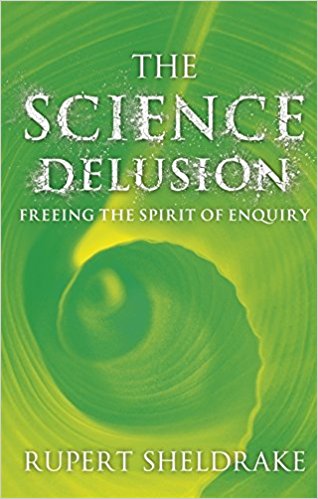Laws of Nature —- Or Habits?
The Science Delusion – Freeing the spirit of enquiry
Rupert Sheldrake
Coronet, 2012, 392 p.
Review by Paul Kieniewicz
Rupert Sheldrake must be one of the most controversial biologists. He is generally new to Polish readers. Educated at Harvard, he trained as an evolutionist. In his latest book, The Science Delusion, (translated into Polish as Nauka – Wyzwolenie z Dogmatów) he questions the approach of much of mainstream science, and what is now known as scientism. He says that scientists by and large are guided by beliefs and dogmas as much as religious people. Sheldrake asserts that those beliefs are not based on evidence, but that they are unproved assumptions. In his book, he questions those assumptions one by one. Is nature mechanis tic? Are the laws of nature fixed? Is matter unconscious? Has nature a purpose? Is all biological inheritance material? Are minds stored in brains? Are psychic phenomena illusory? In each chapter Sheldrake demonstrates why those questions, dogmas of modern science are in fact probably not true.
tic? Are the laws of nature fixed? Is matter unconscious? Has nature a purpose? Is all biological inheritance material? Are minds stored in brains? Are psychic phenomena illusory? In each chapter Sheldrake demonstrates why those questions, dogmas of modern science are in fact probably not true.
For most academics, his questions no doubt sound outrageous. So far his views have received little attention from academics. When his book, Morphic Resonance, (In Polish, Nowa Biologia) was first published, the editor of Nature, Jim Maddox declared that the book should be burned. Coming from a leading scientist, the astonishing statement, suggested that in science there are certain views that are not welcome, because they are a priori forbidden. One would expect such language from a pulpit, where a priest makes a dogmatic assertion, rather than from the leading editor of one of the most prestigious scientific journals. If this was not enough, when Sheldrake delivered an invited talk to TEDx in 2013, discussing material in The Science Delusion, the organization, responding to pressure from several atheists, took the unusual step of removing the talk from their website.
Sheldrake is not asking scientists to change their approach. He is asking them to examine their assumptions. For many years he conducted research to explore the notion of a non-physical field, he calls the Morphogenetic Field that determines how inheritance is transmitted, how nature behaves and how crystals form. This field contains instructions for how nature behaves, how organi
sms develop from seed to plant, how we communicate; even how para-psychological phenomena work. This is not a new idea. It was accepted by many biologists in the early 20th century. Sheldrake cites many experiments and published papers to support his theory. He also suggests that nature possesses a consciousness of its own, a view that borders on pan-theism. Why does the scientific community refuse to listen? Why even in a religious country as is Poland where many scientists are open about their religious views do we see a total rejection of a non-materialistic view of nature?
In this reviewer’s opinion, the problem is that since the Enlightenment scientists have worked tirelessly to remove the spiritual from science. To exorcise any influence of religion. This is seen throughout the nineteenth century with Darwin’s Theory of Evolution, the rise of behaviouristic psychology that denies the existence of the human psyche and in modern cosmology. Any discussion that nature could have a purpose, that the mind might exist separately from the brain are considered by scientists as anathema. Not worthy of consideration. Many Polish scientists, who are religious, such as Prof Michał Heller, do attempt to reconcile the spiritual and material worlds, but they keep them strictly in separate compartments. The idea that the non-material world could in fact be observable, and have an observable effect in our lives, is considered as problematic for Catholic Theologians as much as for traditional scientists.
Sheldrake’s book is designed to provoke discussion. He asks scientists to question their assumptions about the nature of reality. Do we live in a purely material world, or is our natural world intertwined with other realities that make their presence known? If nature is in fact conscious, if the laws of nature are not fixed but are “habits”, we live in a very different world from what we had imagined.


Comments are closed.